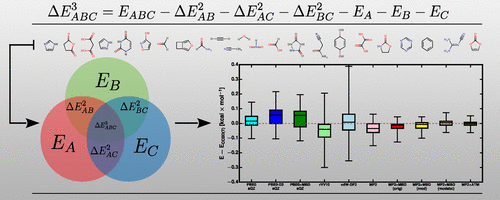当前位置:
X-MOL 学术
›
J. Chem. Theory Comput.
›
论文详情
Our official English website, www.x-mol.net, welcomes your feedback! (Note: you will need to create a separate account there.)
Dispersion-Corrected DFT Struggles with Predicting Three-Body Interaction Energies
Journal of Chemical Theory and Computation ( IF 5.5 ) Pub Date : 2018-09-06 00:00:00 , DOI: 10.1021/acs.jctc.8b00167 Wojciech Jankiewicz,Rafał Podeszwa,Henryk A. Witek
Journal of Chemical Theory and Computation ( IF 5.5 ) Pub Date : 2018-09-06 00:00:00 , DOI: 10.1021/acs.jctc.8b00167 Wojciech Jankiewicz,Rafał Podeszwa,Henryk A. Witek

|
We demonstrate that the dispersion-corrected density functional theory (DFT-D) schemes fall short of predicting reliable three-body interaction energies. This concerns also a popular variant of DFT-D called the “many-body dispersion” (MBD) method, which might seem surprising in the light of the fact that its name contains the very phrase “many-body”. The main reason for the inaccuracy of the three-body interaction energies in the DFT-D schemes can be attributed to internal deficiencies of the standard DFT functionals that the existing “-D” methods are incapable of correcting since the main problems emerge from the terms not related to the dispersion component. At present, it seems that none of the a posteriori dispersion techniques are able to predict accurately the total interaction energy for a supermolecular system together with its simultaneous decomposition into the many-body components. On the other hand, if one is interested only in the three-body interaction energies, we propose an adjustment to the MBD approach that achieves good accuracy in conjunction with the supermolecular MP2.
中文翻译:

具有预测三体相互作用能的色散校正DFT挣扎
我们证明了色散校正的密度泛函理论(DFT-D)方案无法预测可靠的三体相互作用能。这也涉及DFT-D的一种流行变体,称为“多体分散”(MBD)方法,鉴于其名称中包含“多体”这一短语,这似乎令人惊讶。DFT-D方案中三体相互作用能不准确的主要原因可归因于标准DFT功能的内部缺陷,即现有的“ -D”方法无法纠正,因为主要问题来自于这些术语与分散成分无关。目前看来,后验者都没有分散技术能够准确预测超分子系统的总相互作用能以及其同时分解成多体组分的能力。另一方面,如果仅对三体相互作用能感兴趣,我们建议对MBD方法进行调整,使其与超分子MP2结合可获得良好的准确性。
更新日期:2018-09-06
中文翻译:

具有预测三体相互作用能的色散校正DFT挣扎
我们证明了色散校正的密度泛函理论(DFT-D)方案无法预测可靠的三体相互作用能。这也涉及DFT-D的一种流行变体,称为“多体分散”(MBD)方法,鉴于其名称中包含“多体”这一短语,这似乎令人惊讶。DFT-D方案中三体相互作用能不准确的主要原因可归因于标准DFT功能的内部缺陷,即现有的“ -D”方法无法纠正,因为主要问题来自于这些术语与分散成分无关。目前看来,后验者都没有分散技术能够准确预测超分子系统的总相互作用能以及其同时分解成多体组分的能力。另一方面,如果仅对三体相互作用能感兴趣,我们建议对MBD方法进行调整,使其与超分子MP2结合可获得良好的准确性。



























 京公网安备 11010802027423号
京公网安备 11010802027423号